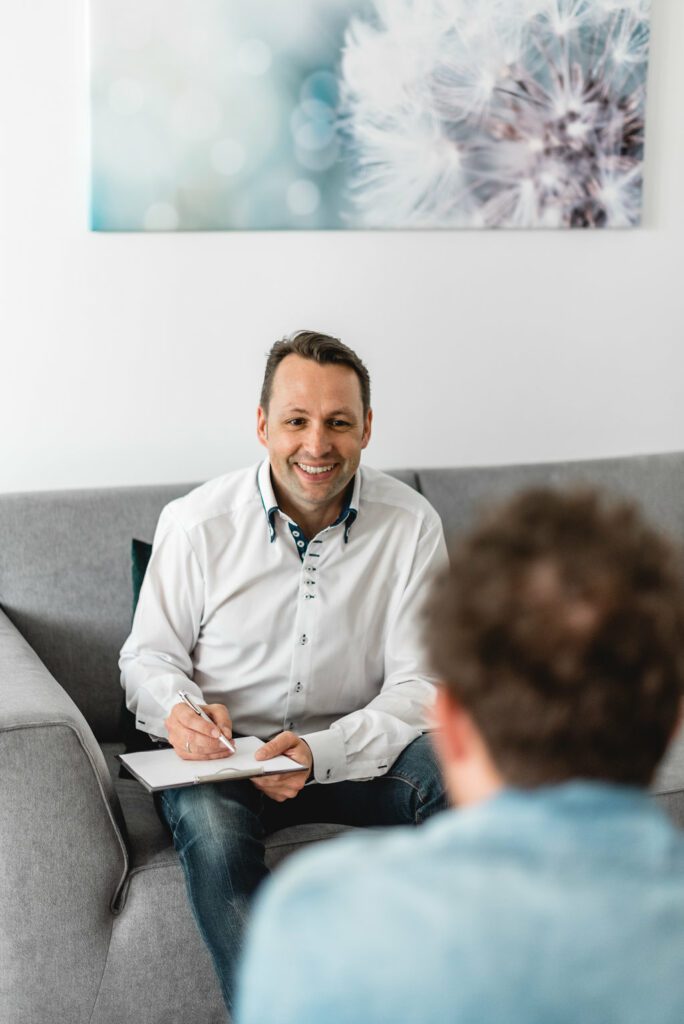Happy marriages are based on a deep friendship. By this I mean a mutual respect for and enjoyment of each other’s company.
John Gottman - world famous researcher in relationshiops, love and couples dynamics
Overview of thie page
Relationship and marriage counselling, couples therapy Vienna 1140 - how can it help?

The beginning of a relationship is most often characterised by the presence of feelings such as love, passion, affection and respect. Both partners typically have the feeling that they are accepted, held and cherished by the other.
It is difficult to believe that this phase will ever come to an end and many couples in love are firmly convinced that these feelings will last a lifetime. With time though most partners begin to develop a new perspective of one another.
They start to see the rough edges to their partner’s character and the differences that separate them from their partner. They discover aspects which they find more difficult to handle and can even cause hurt and pain. This insight can be so unsettling for some partners that they struggle to see their partner in a positive light any more.
They get drawn into an ever increasing spiral of having their attention drawn to their partner’s shadowy sides as their partner’s strengths and good points become eclipsed against this perspective. The relationship, which was once once an impregnable safe haven now reveals cracks and becomes vulnerable to stress and pressure and a source of conflict and difficulty.
A good relationship is not something that happens automatically. Indeed it is a challenging project which requires the attention of both partners. It must be nurtured. Maintaining a happy and satisfying relationship requires hard work. Some couples realise this and despite their best efforts still find themselves having difficulties. Whether arguments are triggered by known “hot topics” or small everyday disagreements, repeated heated disputes can lead to frustration and strain the relationship.
As one or both partners begin to feel increasingly hurt and misunderstood, the relationship can show signs of instability and damage. Relationship counselling, couples therapy and marriage guidance can help the couple to reestablish the safety and stability of a happy relationship and to deepen their bond or to find out whether reconciliation and acceptance are even possible and if the relationship is still viable.
Relationship counselling Vienna: when one partner does not see a problem
A relationship can be placed under strain by disruptive factors which may be internal or external to the relationship. Dissatisfaction with one’s own person, stress in the workplace, financial difficulties, tension from and between other family members etc. can all place a burden on the relationship.
Similarly life transitions and times of great change such as the birth of children, retirement, promotion, marriage, moving country, death and loss etc. bring with them additional stress and challenges for a couple and potentially conflict and tension within the relationship if the couple lacks the resources to handle them.
Now, a couple may or may not agree about the amount of stress that their relationship is under and they may or may not agree on what is causing the difficulties within their relationship. They also may or may not agree on the need to get external help (couples therapy, marriage counselling, relationship coaching etc.) in order to get their relationship back on course again.

In practice partners in my experience usually differ substantially in their motivation for personal change and their evaluation of the situation. Sometimes people simply do not want to face up to things or feel like they have the bandwidth to face the fact that relationship is in troubled waters. For these and other reasons it is not uncommon that a couple cannot agree if there is a problem or not.
Whatever the case may be, my assumption is, that if both partners are there with me, then they will usually be able to agree on a minimum common denominator and that is that at least one of them is unhappy and that we can use the couples counselling/therapy setting to help them evaluate how to get both partners back to a place where they can both feel happy again. As long as I can secure this minimum level of cooperation from both partners then couples therapy/counselling can be meaningful and helpful.
Help! My partner is refusing to come to marriage counselling!

Relationship counselling and couples therapy operates under the assumption that both partners want to change something, however small that change might be. It is however often the case that one partner is feeling the strain of the tension in the relationship more than the other. Some people also are very resistant to the idea that they should or can change something.
It is also very common for one partner to want to try couples therapy/counselling out and for the other to be very sceptical or even absolutely opposed to the idea. There can be various reasons behind this from being dubious about the efficacy of couples therapy through to shame and fear of being confronted about “having screwed up”.
From experience it tends to be a notoriously difficult thing to do to try and change a person against their will and if your partner currently is steadfastly against relationship counselling/therapy then your options may be limited. One option open to you is to tell your partner in very clear terms that you are unhappy and that you do not want to live in this manner any longer. Your request for your partner to come to a couples counselling session my be seen in a different light if your partner understands the gravity of the situation.
It may be, however, that even knowing how serious the situation is, your partner still refuses. In this case it may be worth coming to counselling on your own initially in order to get some help with evaluating the situation, what your options are and how you might communicate these options to your partner. Some people also find that it is still worth considering working on themselves even if their partner is not yet ready for change. Many clients report that when they change their attitudes and behaviours towards their partners, their partners also start to change in response.
Emotionally Focused Therapy For Couples (EFT-C)

My approaches to couples therapy and counselling
I am a trained in systemic family therapy, emotionally focused therapy for couples (EFT-C) and hypnotherapy. My approach to treating couples combines all three of these schools although the foundation of my approach is emotionally focused therapy.
Emotionally focussed therapy sees people in terms of attachment science. Attachment science says that people have an underlying and very fundamental desire for connection with other human beings.
Evolution has made us social creature and just as animals need their pack or their herd, our instincts our mammalian and we too have a deep-rooted need for close relationships where we have a sense of belonging and feeling safe and supported.
Essential questions in relationship counselling with EFT
It is this need for secure connection that is a basic driver behind human behaviour. Attachment sciences views the dynamics within couples and families in light of this intrinsic motivation for safety and secure connection. Implicitly we all evaluate our relationships on the basis of very simple but profound questions:
- If I call for you, will you come?
- When I need you and turn to you, will you be there for me?
- Can I reach you when I need you?
- Do I really matter to you?
- Do you accept me for who I am?
- Do you respect me, cherish me and desire me?
- Are you interested in my pain, my happiness, my sadness and my fears?
- Will you make me a priority in your life? Am I important to you?
In order to be able to answer these very essential questions with “yes”, the theory behind emotionally-focused therapy states that three basic qualities must be present in the relationship:
Accessibility
This is about being there for your partner, not just physically but emotionally. We have a fundamental need for their partners to show interest in their feelings and to feel understood and validated by our partners.
Responsiveness
It is important for us to have a significant other who is accessible and responsive when we need them. They show us they care, reassure us, comfort us, and let us know that we are important for them, that they are interested in our concerns and joys. They can commiserate with us when we get bad news and celebrate with us when we get good news.

We need to know that our partner’s really care and that they are just going through the motions in order to placate us. We want to know that we are not an irritation to them. We need to know that they really, really, care, that they really love us. For this a level of emotional engagement is necessary. If we are sad or afraid, we need to see the concern reflected in their face, in their eyes and in their voice. If we are happy that they share our joy on an emotional level.
Relationship stress from the perspective of Emotionally Focused Couples Therapy
Relationship distress occurs when the secure connection of the relationship comes under threat. It happens when we turn to our partners, and they are not there for us or are preoccupied.
It increases when our partners are not responsive to our distress or do not seem to care about the things that are important to us. It creeps into relationships when partners seem disinterested, cold or distant. It hits us when our partners do not seem to appreciate us, value us or are rejecting of us.
These are all moments when, as the relationship researcher, John Gottman says, the presence of four apocalyptic riders in the room can be felt. These riders have name and their names are Criticism, Contempt, Stonewalling (a.k.a. Denial) and Self-Justification (a.k.a. Moralising).
Reducing Relationship Stress: The First Phase of Emotionally Focused Couples Therapy (EFT-C)

A first goal of emotion-focused couples therapy is to help couples reduce relationship stress and restore safety to their relationship. Couples who are comfortable with each other can recognise when a negative relationship dynamic is underway and can de-escalate to restore safety.They can repair and reconnect to one another.
Safety is the basis for couples from which couples can deepen their bond to one another which is a subsequent goal of the emotionally-focused approach. In this second phase of therapy clients are helped to become more accessible, responsive and emotionally-engaged with one another.
Strengthening and Deepening the Bond: The Second Phase of Emotion-Focused Couples Therapy (EFT-C)
Positivity: is about being able to see your partners strengths, talents and likeable aspects. It is also about developing a compassionate view of their more difficult aspects. A key here is to understand their behaviour in terms of a universal human need to reduce our suffering and maximise our happiness. People are generally not out to hurt others primarily but to protect themselves, their relationhsips, their values and their integrity etc.
Empathy: refers to the ability to put oneself in another person's shoes and see the world through their eyes. Empathy is not something that is "given", like an object. It is a process that requires a person to try to resonate with another's experience to see if they are getting it right and then, if necessary, make adjustments to better align with the other's experience. In this process, we are not empathic when we think we are, but when our interlocutor says, "Yes, you get it. This is what it is like to be me, to be in my situation".
Availability: means to some extentactual physical presence, but not only. Research shows that long-distance relationships can be just as satisfying as short-distance relationships, which shows us that geographical proximity is not a prerequisite for people to feel emotionally connected to each other. Rather, it is about being emotionally available. Being emotionally available means being emotionally interested in the other person's world, opening up and sharing your emotional world with them and letting them know that they matter and that you want to be there for them.
Compassion: refers to the ability to recognise another person's pain and actively seek to alleviate it, evoke understanding and foster a sense of connection. Bonding is strengthened in couples where there is a sense that the couple is already going above and beyond for each other. This emphasises the shared journey as more important than the individual - selfless acts of alleviating the other's burdens and worries show genuine care and reassure the other that they are loved and important.
Engagement: refers to emotional commitment. This means prioritising the needs of the partner. In romantic relationships emotional commitment promotes trust, intimacy and emotional security. Showing that your partner comes first builds a strong foundation of love and respect. It improves communication, deepens connection and strengthens bonding, leading to a fulfilling partnership. It promotes happiness, emotional well-being and overall satisfaction in the relationship, ensuring long-lasting love.
Couples therapy, relationship and marriage counselling Vienna 1140 - Terminvereinbarung
Kevin J. Hall, MSc
Psychotherapist (systemic family therapy), cert. emotionally focused therapist (ICEEFT), ACC/IOBC Senior Coach, Hypnotherapist (ISH)
Kontakt Details
+43 1 9900858
kevin.hall@wish.wien
Address
WISH Mindscience, Straßgschwandtnerstraße 4/1, 1140 Vienna, Austria
